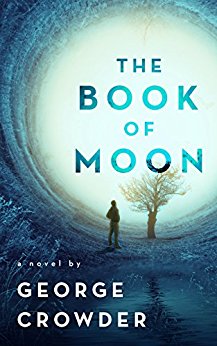The Book of Moon was the winner in the Literary Fiction category of the 2017 IndieReader Discovery Awards, where undiscovered talent meets people with the power to make a difference.
Following find an interview with author George Crowder.
What is the name of the book and when was it published?
The Book of Moon, published November, 2016
What’s the book’s first line?
“I was nothing.”
What’s the book about? Give us the “pitch”.
The fifteen-year-old narrator, Moon Landing, relates to the biblical story of Job. God, if there is one, seems to be inflicting him with one misfortune after another. Part poignant coming-of-age story, and part paean to the joys, ironies and frustrations of adolescence in modern America, this book explores characters and issues of interest to readers well beyond their teenage years.
What inspired you to write the book? A particular person? An event?
While Moon’s story is not really based on my life, I have long shared his misgivings about God’s treatment of Job. It’s the grain of sand that, hopefully, wrought a pearl.
What’s the most distinctive thing about the main character? Who-real or fictional-would you say the character reminds you of?
Moon has a distinctively wry point-of-view that makes his narration thoughtful, witty, and humorous. Dare I say this is an idealized version of my own perspective?
What’s the main reason someone should really read this book?
Though this novel treads familiar ground, the prose, dialogue and tone are fresh and original. The book is a quick, entertaining read, laugh-out-loud funny, with memorable characters and a touching ending. Above all, this book is enjoyable.
When did you first decide to become an author?
Following college I was prepared to go to business school. However, a chance encounter on the beach with a stranger—who was reading a very good book—turned to talk of literature and the movies. I realized that telling stories was my first love, and I set my sights in that direction. My bank account has been the poorer for it, but I hope that the world will be a bit richer with the narratives I can offer.
Is this the first you’ve written?
For years I wrote for movies and TV with little success. They say that Hollywood is the only place where you can “die of encouragement”—but before that could happen, I turned to teaching! After twenty-two years in the classroom, this is my first novel—and the second is finished and ready for editing!
What’s the best and the hardest part of being an indie?
An independent must not only be the writer, but be the publisher and marketer as well. The first goal is to create a book that is indistinguishable from a conventionally-published book. So an independent writer must purchase the support services necessary to do that—cover designer, editors, proof reader, typesetter. Yet, I find this the most satisfying part of the process, since I love the people I work with and think they do a brilliant job for the project. Marketing is a challenge that never ends, yet conventionally-published writers are also confronted with this task!
Would you go traditional if a publisher came calling? If so, why?
If I could find the right agent and right publisher I would be very intrigued. I’d be particularly interested in opportunities to write for movie and TV as well, and for representation for the film rights to my work. I have nothing against the traditional path, but I see little purpose in years spent querying agents when the means exist to allow the marketplace to speak for itself. Nobody wanted my book—except the readers, who have been outspoken in their appreciation.
Which writer, living or dead, do you most admire?
It’s so hard to name just one! But if pressed…Larry McMurtry has long been a favorite who not only makes me laugh, but writes thrilling drama and wonderful characters.


